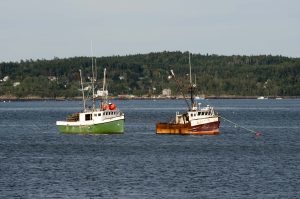Researchers to Engage Fishermen on Topic of Sustainable Management
 Farmers have some measure of control over the land they till. They can buy it, divide it, get rid of things they don’t want. Not so for fishermen
Farmers have some measure of control over the land they till. They can buy it, divide it, get rid of things they don’t want. Not so for fishermen
Like the fish and crustaceans they seek, fishermen are at the mercy of submerged ecosystems they cannot control. And, increasingly, scientists are aware that these systems are changing, displaying troubling shifts due to human impact and climate change.
Changes in the ocean can mean economic changes for fishermen who depend upon it. Right now, fisheries management consists of a separate system for each species, but researchers think the answer to more sustainable fisheries and better economic opportunities may lie in a more place-based, ecological approach. This will, however, require fisherman across fisheries to be actively involved in a cooperative structure.
“Fishermen have knowledge of these fisheries and these waters that no one else has. Their participation is essential to effective management.” But we don’t yet know how they interact with each other across fisheries or if they do,” said Joshua Stoll, graduate student and co-investigator on a project taking an early look at sustainable governance concepts.
Stoll and colleagues at the Senator George J. Mitchell Center for Sustainability Solutions and the School of Marine Science are taking the early steps in an effort to evaluate the potential for place-based ecosystem management. The project involves collaboration between fishermen from Maine’s diverse fisheries, scientists, local government officials and representatives from non-governmental agencies. See more on this story
